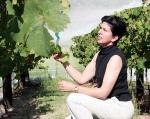Native insects take the fight to chardonnay-chewing pests
 Pest Science Pest Science
South Australia could be the first State to eliminate the use of pesticides in vineyards, thanks to the work being done by a University of Adelaide researcher. Cate Paull, a PhD student from the Waite campus, has recently completed a 4-year project in the Coonawarra on reducing the use of pesticides in wine grape production. It is one of the first projects of its kind in the Australian wine industry and paves the way for viticulturists to use insects, instead of pesticides, in a beneficial way to help fight insect pests. Ms Paull's research identified many native insect predators and parasitoids, which could be used to help control the light brown apple moth (LBAM) - a major pest of grape vines. "Beneficial insects have the potential to contribute to providing a free pest control service," Ms Paull said. "However, before grape growers can exploit this service we need to understand not only the biology of the insects involved, but how vineyard management practices influence beneficial insects." Ms Paull identified several species of parasitic wasps and mites as effective biological control agents of the offending moths. "The really neat twist to these findings is that normally in biological control we would be looking at an exotic pest. This just happens to be a native moth that would much rather chew on chardonnay than eucalypts." The project is a joint collaboration between the University of Adelaide, the Australian Research Council and the Coonawarra Grape Growers Association. "Coonawarra is world renowned for its premium wines and they have a very forward thinking bunch of growers down there," Ms Paull said. "This project has become a priority for them because they want to find a sustainable way to control pests and they also want to capitalise on a clean, green image for Australia by reducing the use of pesticides in vineyards." Worldwide, there is a growing demand for "organic" wines, but Ms Paull says it will take a decade to reap the benefits of the cost savings achieved through biological control. "The foundations have now been laid for reducing pesticides in vineyards in Australia and growers are enthusiastic that in the future, instead of spending hours on a tractor spraying pesticides, native insects will do the job." Ms Paull completed an undergraduate degree in Natural Resources at Roseworthy campus and her Honours focused on insect biological control. She then worked with the CSIRO to help find a cure for an exotic pest, the red-legged earth mite. Her PhD was supervised by Professor Andy Austin and Dr Nancy Schellhorn from the School of Earth & Environmental Sciences. Story by Candy Gibson
|





